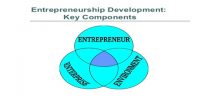Sometimes a manager and an entrepreneur are considered as same. Managerial strategic orientation depends on controlled resources. The entrepreneur’s strategic orientation depends on his or her observation of the opportunity. This orientation is most significant when other opportunities have diminishing returns accompanied by rapid changes in technology, consumer economies, social values, or political rules.
But, there are some basic differences between them. These are as follows:
Entrepreneurial decision making
- Definition: An entrepreneur is a person who creates something new and assumes the risks and rewards associated with that innovation.
- Strategic Orientation: The entrepreneur’s strategic orientation depends on his or her perception of the opportunity.
- Motive: The main motive of an entrepreneur is to start a venture by setting up an enterprise
- Status: An entrepreneur is the owner of the enterprise.
- Risk-bearing: An entrepreneur assumes all risks and uncertainty involved in running the enterprise.
- Rewards: An entrepreneur gets profit as his reward for bearing risks.
- Innovation: An entrepreneur is an innovator.
- Qualifications needed: High achievement motive, creativity, foresight, risk-bearing ability and so on.
Managerial decision making
- Definition: A manager is an employee of the entrepreneur who performs all managerial functions for the entrepreneur’s enterprise.
- Strategic Orientation: When the use of planning systems is the strategic orientation, the administrative domain is operant.
- Motive: The main motive of an entrepreneur is to render his service in an enterprise already set up by someone else.
- Status: A manager is a servant in the enterprise owned by the entrepreneur.
- Risk-bearing: A manager does not bear any risk involved in the enterprise.
- Rewards: A manager gets a salary as his reward for rendering his service.
- Innovation: A manager converts the entrepreneur’s ideas into practice.
- Qualifications needed: Sound knowledge in management theory and practice.
From the above discussion, it is clear that an entrepreneur, at times, can be a manager but a manager cannot be an entrepreneur. After all, an entrepreneur is an owner, but the manager is a servant. So, it has been rightly said: “All managers are entrepreneurs but all entrepreneurs are not managers”.
















